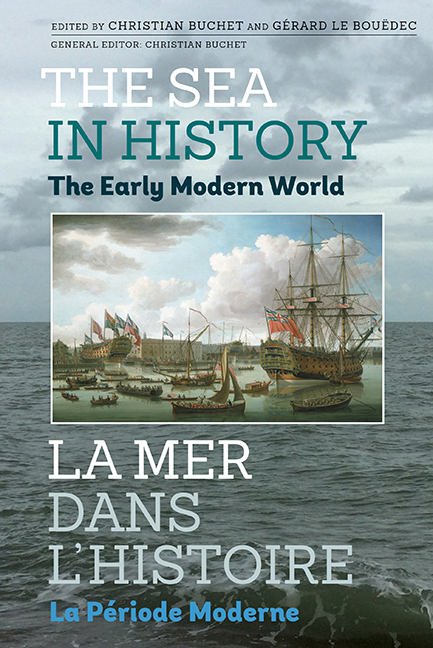Book contents
- Frontmatter
- Contents
- List of Illustrations
- List of Contributors
- Introduction générale et remerciements par
- General introduction and acknowledgements
- Introduction (français)
- Introduction (English)
- LA RÉUSSITE PAR LA MER:La reussite par la mer des territoires et des communautés littorales
- La construction d'un espace mondial: La circulation maritime et les ports
- La forte croissance de l'économie des pêches et des échanges
- Les acteurs de la dynamique maritime
- LA PUISSANCE MARITIME INSTRUMENT DE LA PUISSANCE POLITIQUE ET D'UNE STRATÉGIE GLOBALE DE RAYONNEMENT VOIRE DE DOMINATION: Les puissances maritimes occidentales
- L'océan Indien, entre convoitises et indifférences
- Les puissances maritimes asiatiques
- China's maritime world
- Le Japon et la mer
- Transformation of the maritime world in the Indonesian archipelago
- Corée: les navires garants de la souveraineté
- L'Afrique
- La politique maritime et l'idéologie
- Mer et développement technologique
- Développement maritime et maîtrise économique et financière
- Développement maritime et maîtrise organisationnelle
- Conclusion (français)
- Conclusion (English)
- Conclusion générale par
- General conclusion by
- Miscellaneous Endmatter
- Miscellaneous Endmatter
China's maritime world
from Les puissances maritimes asiatiques
Published online by Cambridge University Press: 11 May 2017
- Frontmatter
- Contents
- List of Illustrations
- List of Contributors
- Introduction générale et remerciements par
- General introduction and acknowledgements
- Introduction (français)
- Introduction (English)
- LA RÉUSSITE PAR LA MER:La reussite par la mer des territoires et des communautés littorales
- La construction d'un espace mondial: La circulation maritime et les ports
- La forte croissance de l'économie des pêches et des échanges
- Les acteurs de la dynamique maritime
- LA PUISSANCE MARITIME INSTRUMENT DE LA PUISSANCE POLITIQUE ET D'UNE STRATÉGIE GLOBALE DE RAYONNEMENT VOIRE DE DOMINATION: Les puissances maritimes occidentales
- L'océan Indien, entre convoitises et indifférences
- Les puissances maritimes asiatiques
- China's maritime world
- Le Japon et la mer
- Transformation of the maritime world in the Indonesian archipelago
- Corée: les navires garants de la souveraineté
- L'Afrique
- La politique maritime et l'idéologie
- Mer et développement technologique
- Développement maritime et maîtrise économique et financière
- Développement maritime et maîtrise organisationnelle
- Conclusion (français)
- Conclusion (English)
- Conclusion générale par
- General conclusion by
- Miscellaneous Endmatter
- Miscellaneous Endmatter
Summary
ABSTRACT. Contrary to general opinion, the maritime had a non-negligible impact whether in terms of food supplies or naval construction to ensure coastal protection or state income by means of taxation. The few periods in which Chinese emperors invested in a more powerful navy coincided with the country's hegemony in the zone in the dual capacity of prestige and trade.
RÉSUMÉ. Contrairement aux idées reçues, le maritime eut un impact non négligeable que ce soit en termes de ressources alimentaires ou de construction navale pour assurer la protection du littoral, et de revenus pour l'Etat par le biais des taxes. Les rares périodes auxquelles les empereurs se dotèrent d'un instrument naval plus puissant coïncident avec l'hégémonie du pays dans la zone au double plan du prestige et du commerce.
Though a coastline of some 15,000 kilometers from Korea to Vietnam has historically bounded and defined it, China has a reputation as a continental, not a maritime, empire. This reputation is not entirely misconceived, deriving in part from the sheer size of the land empire, which over two millennia has ballooned into the Eurasian interior to such an extent that it has steadily driven down the ratio of land area to coastline. The Chinese have regularly and consistently interacted with—traded with, escaped into, invaded and been invaded by—the peoples and territories to the north and the west, and most Chinese regimes have formed through the dynamic of that interaction. This in turn has fed a potent myth of cultural origination in the loess hills along the upper reaches of the Yellow River, a myth that continues to persuade the Chinese that they are children of the yellow earth, not progeny of the blue ocean. Historians for three millennia have followed suit, writing China's history as an unbroken sequence of land-based dynasties whose capitals are never port cities and whose military heroes have commanded armies, not armadas.
With this idea has coexisted another reality. For, as state and economy have historically expanded toward the interior away from its coastline, simultaneously they have extended in the opposite direction out to sea.
- Type
- Chapter
- Information
- The Sea in History - The Early Modern World , pp. 551 - 563Publisher: Boydell & BrewerPrint publication year: 2017
- 1
- Cited by



